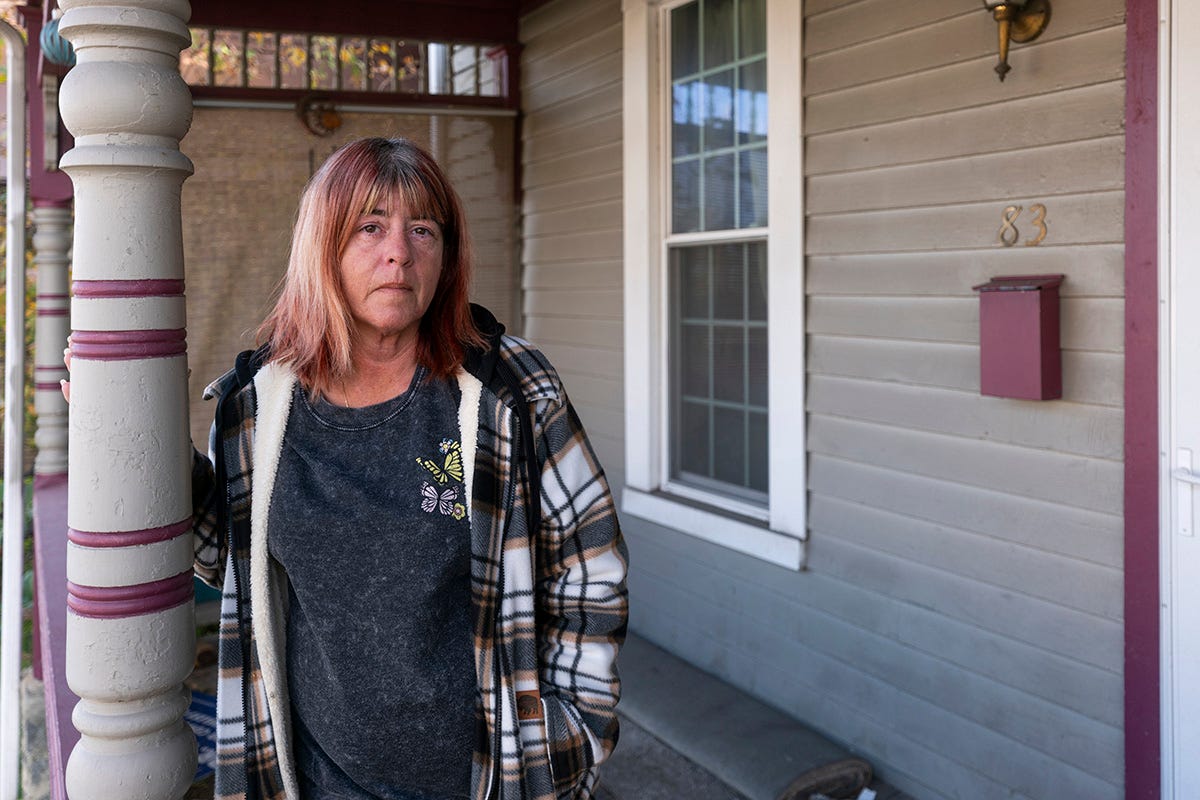
In 2016, when “everything was broken,” truck driver Shelle Lichti voted for Trump. Didn’t matter that she was a lesbian, that she drove a Pride-themed rig called the Rainbow Rider with her three-and-a-half-pound chihuahua, Zulu, in the passenger seat. Trump seemed to get it. But once he was in office, he was “like a child throwing a temper tantrum.” In 2020, she voted for Joe Biden, who she called a “seat-filler.” Since then, she’s been floating. She hated MAGA, but she didn’t think Democrats got why MAGA had happened in the first place, which exacerbated all the anger that had fueled Trump.
“We’re so angry now, we don’t see anything else,” Lichti, 52, told me over the phone last month from Oregon. “Everyone is so tired. They’re trying to figure out how to divert this train from the tracks they’re currently on—from Trump’s neuroticism and narcissism, the ripping down of government, the tearing down of other people, this fatigue everyone is feeling.”
That’s why Lichti cast her vote early for Kamala Harris in the state of Missouri. “I don’t really know her,” she admitted. “Does anyone?” But Harris isn’t Trump, and she said nice things about America and everyone getting along, and that seemed like a start, Lichti said.
“I decided to vote for her pretty much as soon as that option became available, as soon as a definitive person was put forth,” she told me.
America is said to be fatigued by the endless campaign cycle of 2024—which actually started in November 2022, when Donald Trump announced his reelection bid. But many Americans I’ve spoken to over the past few days say they are eager to cast their ballots.
That’s evidenced by the fact voters are turning out in greater numbers than ever at the polls. So far, 78 million have cast early ballots—just over half the total number who took part in the 2020 election. In the swing states of North Carolina and Georgia, which were hit hard by Hurricane Helene, voting is at record numbers. Ditto in the battleground state of Michigan.
But amid all of the voters’ swells of emotion, there is also a great deal of confusion—about who or what, exactly, they’re voting for.
In January, I reported on “The Great Scramble” enveloping American politics: It was unclear what liberal or progressive or conservative or Republican or Democrat meant anymore. Which boxes we belonged in.
Now that it’s Election Day, The Free Press went back to several characters, such as Lichti, who we’ve featured over the past election cycle and asked who they’re voting for. Many had run headlong into the tumult of identity politics, and even been frozen out or punished for their beliefs. Others were part of the messy middle who felt neither party represented their values.
Here’s a snapshot of what they said:
Brian Lasher, a former Navy commander who teaches American history at a small Catholic college in Erie, Pennsylvania, said he’s voting for Trump.
“My priorities are reducing inflation, ending mass illegal immigration, an impartial judicial system, and secure elections, and I do not believe a Harris administration will have my interests at heart,” Lasher said.
He was not a fan of Trump, but he didn’t know where else to go. He said what he said the last time we spoke in January, which was that Trump was an “asshole.” He voted for the asshole in 2020. And he was sticking with him.
“The inflation really struck us hard,” Lasher told me. “And the border—this is crazy. To let people in unvetted?” He wasn’t against immigration, but he wanted order. Also, there was Israel. “I feel very badly for the Palestinians, but I worked in the Middle East”—when he was in the military—“and Hamas, these people are evil, and Israel has to finish the job.”
Others told us they weren’t motivated by a candidate as much as a single issue. For Joe Gow, former chancellor of the University of Wisconsin–LaCrosse, that issue is the right to consume or publish porn.
Gow, who was fired from his chancellor position after he posted pornographic videos he made with his wife on social media, told us he is voting for Harris.
“It seems like Trump is aligning himself with Christian conservatives who actually are talking about making pornography illegal—that’s in Project 2025,” Gow told The Free Press of the manifesto said to summarize Trump’s platform and has been likened to a Handmaid’s Tale–style roadmap. “It’s included in there that they want to make it illegal.”
He acknowledged that Trump has distanced himself from Project 2025, which was published by the conservative Heritage Foundation, but added: “I’m voting for somebody that I think would keep me in my teaching job, and I think the Democrats are headed more in that direction.”
Dennis Kucinich, the former Democratic congressman who ran for president in his party’s primary in 2004 and more recently managed Robert F. Kennedy Jr.’s presidential campaign, declined to say which presidential candidate he’s backing. In 2004, Kucinich was well to the left of his Democratic rivals, including the eventual nominee, Senator John Kerry.
Kucinich noted that he’s running as an independent for Congress in Ohio’s seventh congressional district—a district in the northeastern part of the state that voted 65 percent for Trump in 2020. “I’ll work with whomever the people choose,” he texted me.
When I asked Kucinich which issues he’s running on, he pointed me to his campaign site, which calls for, among other things, defending freedom of speech and Social Security, and securing the southern border.
“My position,” Kucinich says in a video, which “some people may think it’s heartless—seal the border. You don’t have a country if you don’t have borders.”
Oliver Anthony, the country singer from central Virginia who went viral in the summer of 2023 with his song “Rich Men North of Richmond”—which attacked Washington, D.C., insiders, and fell afoul of progressives for giving voice to the plight of white, rural folks—isn’t saying who he’s voting for either. When The Free Press’s Rupa Subramanya profiled him back in August last year, he said: “I’d like to stay out of politics.”
He couldn’t be reached for comment for this story, but in a YouTube video this month, Oliver refused to reveal his preferred candidate. Although he did admit, “I guess I’m a conservative, but—I’m a conservative because I believe in the First and Second Amendment. But I don’t know if I’m necessarily a Republican or what the hell I am.”
Amy Wax, the former University of Pennsylvania law professor recently fired by the university for offensive speech, was happy to share her candidate of choice. She told me she’s voting for Trump.
“I am no fan, and think he is a highly flawed candidate,” Wax said in an email. “But the Democrats are unthinkably destructive on the issues I care about most: Israel, the state of education (K–12, higher ed, professional education), free expression and free thought, meritocracy and the preservation of competence and excellence, strict enforcement of immigration laws.”
She added that Trump had nominated “highly qualified judges and justices” during his first term.
Blake Flayton, who wrote an essay for The Free Press in 2022 explaining that he was moving to Israel because of left-wing antisemitism, meanwhile, is voting for Harris.
“I voted Kamala, reluctantly, and with a lot of grievance against Democrats,” Flayton emailed me. “She’s a bad candidate and if Biden had not been a stubborn SOB we would’ve had a proper primary and a candidate who would win tomorrow. Alas, I’m predicting a wipeout.”
Chia Morgan, a social worker in Flint, Michigan, who played a key role in bringing attention to the city’s water crisis, told me she’d always voted for Democrats and she planned to keep voting that way. But she’s not averse to supporting a Republican—just not Trump.
“It’s just right now there’s no Republican ticket out there that aligns with my personal values,” Morgan said.
Krissy Ferguson, in East Palestine, Ohio, who had to evacuate her childhood home following the 2023 train derailment there, told me she’d be voting Trump.
“The past two years I have heard so many politicians promise us help,” Ferguson texted me. “Help that still has not come. Harris has never addressed East Palestine. I’m voting for Trump because at least he showed up.”
Stephen Horn, a blogger outside Raleigh, North Carolina, who was found guilty of misdemeanor charges after taking part in the January 6, 2021, Capitol riot, told The Free Press that he’d choose neither Trump nor Harris. He plans to write in Thomas Massie, the Republican congressman from Kentucky, a libertarian who recently joined forces with the uber-progressive Squad in its opposition to sending U.S. aid to Israel.
“For Trump,” Horn said, “the main issue I have is his personal and moral character.”
Nor could he vote for the pro-choice Harris. “I believe the federal government should do whatever is in its jurisdiction to prevent unborn children from being murdered,” he said.
In short, the voters we spoke to have loose affiliations with the old parties, the old labels, but their loyalty is mostly to particular ideas or positions, not party agendas. They don’t know what people like them will be called in four or eight years.
As for the high turnout in this election? We shouldn’t assume that’s a good thing, said Lee Drutman, a senior fellow who has studied voter participation at New America, a center-left think tank in Washington.
We used to think high voter turnout meant civic-mindedness, but in 2024 it seemed to signal a “sense of existential anxiety about half the country getting their preferred candidate into the White House,” Drutman said.
Voters are afraid that if their candidate loses the republic will perish, convinced that this may be “the last election,” as Trump surrogate Elon Musk warns, or that the “fascists” are on the cusp of taking over, as Kamala Harris insists.
“Our current environment is so unstable and torn into pieces that anything, including the election—regardless if it goes Trump’s way or not—could light the short fuse for violence,” Shelle Lichti texted me. “Our country’s citizens can and will reach a breaking point.”
Peter Savodnik is a writer and editor for The Free Press. Follow him on X @petersavodnik, and read his piece “The Abandoned Americans.”
For more coverage of the 2024 election, click here.
To support more of our work, become a Free Press subscriber today:






